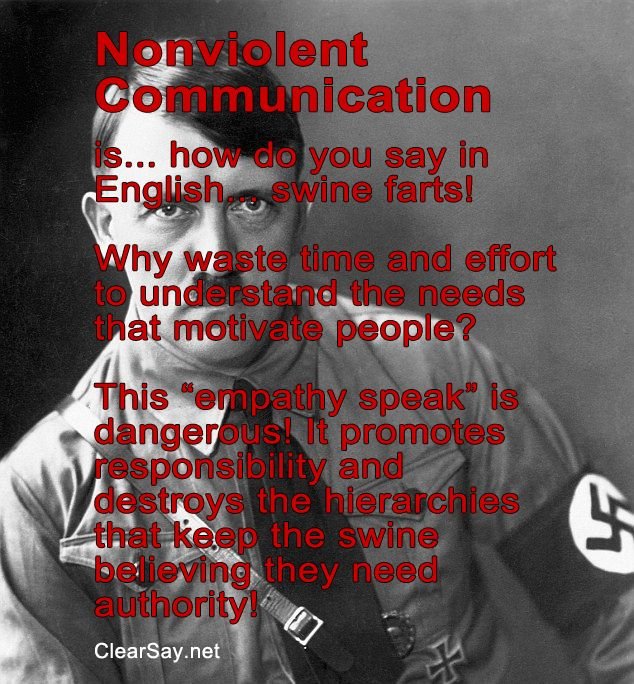Does Nonviolent Communication (NVC) sound like PC talk to you?
That title sure looks like political correct (PC) languaging (cultural Marxism) to me! It's funny because
Nonviolent Communication (NVC) is the opposite of PC talk
The quick & easy way to show this: NVC teaches that in most situations we are responsible for our own feelings. Yep, the opposite of the "principle" underlying PC.
For the purpose of efficiency, I'll use the term "Voluntaryist" hereinafter to describe libertarians, anarchists, and agorists. I know the label may not EXACTLY fit you, but please just go with it.
Have you ever wished you could SHOW/SHARE/SPREAD your Voluntaryist ideals more in everyday life; be able to act in a way that actually influences the people around you to better understand how valuable individual liberty is 82.5% of the times you speak?
Isn't it ironic that people who want less coercion in the world would use language full of coercion?
Notice how often you hear attempts to motivate people via guilt, shame, demands, punishment, or reward. Of course, not YOU! It's THEM, heh! See how this can be ironic for people to use those tactics when they espouse liberty as their favorite value? My belief is that IF WE WANT REAL CHANGE...
We must focus on the foundations of interaction and one of those is language.
OK. So what you are about to read about moral judgement might throw you for a loop. But hold on to your pants because you'll understand in a moment.
Our language is full of evaluation and moral judgement that can make it easier to dominate individuals. When you group "those people over there" under the label "bad", then it is easier to convince others that it is OK to take some action against the "bad" people. We need judgement and discrimination, though. It's just the TYPE of judgement that is the problem here. I propose a shift from MORAL JUDGEMENT to VALUE JUDGEMENT. Nonviolent Communication (NVC) is a tool that make this process clear and easy.
A Voluntaryist might say, "What's that about moral judgement!? I rely on moral judgement in order to determine right action from wrong action!"
Please allow me reassure you:
NVC is not a morally subjective language
It's more about when you want to understand the perspective of another person than when you are seeking to ferret out objective truth. So if we want to truly deeply understand the perspective of another person, we leave our subjective evaluation of that person out of the equation. So yeah, if the purpose of a particular conversation is to find objective truth, then you may not use a fully NVC-type style of communication. That said, the objectivist might find stage one of the "NVC formula" quite interesting because it helps us distinguish between what is objective reality and what is subjective (feelings).
If you value responsibility and I bet you do
Notice the two following statements and which one supports a more "I'm responsible for my shit" approach:
- "That movie sucked."
- "I didn't like that movie."
Taking it a little further:
- "That movie sucked. It had a lame plot."
- "I didn't like that movie. I was bored because I wanted more mental stimulation."
See how "That movie sucked" is an evaluation and how - taken literally - it assumes the speaker's perspective is THE perspective? See how it confuses subjective perception with objective reality? See how "I didn't like that movie" takes responsibility and leaves more space for other people to have differing opinions?
NVC is an approach that shines truth on ways of communicating that support coercion and dodging of responsibility, and that tend to stimulate an aggressive or defensive response.
NVC provides a structure for beginners to easily learn the "language". Of course, the goal is to practice with this structure to the point where the principles of NVC are integrated enough so that we become "natural" with it and stop using the formula.
What is this formula? First...
What are the NVC principles?
- We are usually responsible for our own feelings.
- Everyone has their own perspective. We can accept and disagree simultaneously.
- Empathy can be cognitive and/or emotional.
- We avoid using blame, shame, guilt, or demands.
- We want others to act only in ways that serve themselves.
- We strive not to give advice, unless it is explicitely asked for or we first ask permission.
- We strive not to reassure, unless it is explicitely asked for or we first ask permission.
- Evaluation and moral judgement get in the way of understanding the perspective of another person (empathy).
What is the NVC formula?
Stage 1
Observation: Separate the objective from the subjective evaluation: "What happened?" What we saw/heard/etc. So, instead of "You came home really late!" we would say, "You came home at 8pm." This is a powerful practice to help us get better at distinguishing what is reality and what is emotion!
Stage 2
Feelings: Identify the feelings of ourselves and others. "I am pissed off!" or "Are you disappointed?" Sometimes people are afraid to reveal how they feel. Here is one of the ways NVC can be liberating. We give people permission to express an emotion that they may have been programmed to hide for fear of looking ugly or weak or even fear of hurting our feelings. We want them to know that even if our feelings might be hurt, WE PREFER TRUTH.
Stage 3
Needs/Values: Attempt to understand the met and unmet needs/values that are being expressed. Most people do not even think about the needs/values underlying their feelings and actions. We ask a question to determine if our guess at their needs/values is correct. "Did you want more consideration for your perspective?" or "Did you want more respect?" or "Where you doing [that thing] because fairness is important to you?" We want to ask this question in a way that encourages the other person to correct us if we did not guess right. I call this process "calibration." More on that in another article.
Stage 4
Positive Do-able Request: If applicable, make a positive do-able request. This part of NVC is very much in favor of our interactions being voluntary in nature. We make sure to be clear on the difference between request and demand because we want people to do a thing ONLY when it is something they want to do.
This type of listening/communication goes deeper than feelings and down to the underlying needs/values. It increases our understanding of each other so that over time we more often look at and understand the motives (needs/values) underlying the actions people take.
So instead of thinking, "What a dickish way he is driving!"
We'd think, "He just passed me going 100 MPH. I wonder if he was worried about getting to work on time because of a need for security?"
Needs? Ick
Now if you are a Voluntaryist like I am, warning signs might come up when you hear about "needs". Remember the socialist saying, "From those according to their ability to those according to their need"? Yeah, ick. No need to worry. NVC draws a clear line between recognizing a person's needs and any obligation to fulfill those needs.
NVC teaches the only obligation we have is obligation we choose
My personal take on NVC needs is that they are more like "wants" than actual live or die "needs". I'll write more in future articles on needs/values.
NVC is a language of empowerment
A person who understands NVC will be less likely to treat another person like a door mat or allow themselves to be treated so.
NVC is a language of choice and responsibility
NVC teaches us that we always have choices and we hold ourselves responsible for our choices and our feelings. So it discourages anything akin to slavery.
Example: Instead of saying, "I have to...", we say, "I choose to..." or "I intend to" or "I want to." Do you see how this minor shift in the way we think/speak - with repetition until it becomes habit - can liberate us and even those we speak with?
Another principle NVC shares with Voluntaryistm is that we want people to do things for intrinsic (their own) reasons rather than to appease or protect the feelings of others. We recognize that when we "get" people to do things they don't really want to do, this creates resentment and no one wins.
Do you want to improve most* of your relationships as well as spread Voluntaryism?
I have a suggestion that will improve most* of your relationships as well as make it easier to show people how and why individual freedom is the choice that serves them best. If you want to help people understand why Voluntaryism leads to prosperity for all, it is much easier for people to see first how NVC works because it is more about common every day interactions between individuals. It is much easier to understand the principles of freedom when applied on a personal level with your husband, wife, kids, clients, co-workers, partners, boss, etc.
*I say "most of your relationships" here because I've definitely seen relationships destroyed by NVC. Luckily, it's a minority of them. Yet another topic I need to write an article about. I'll probably call it something like, "Why NVC destroys some relationships" and maybe another called, "Why some people hate NVC".
Back on track: So here we have a Statist who sees the direct (maybe even immediate) benefits of using NVC in their life. From there it is natural for them to extrapolate and apply it to politics. Imagine the person new to ideas of liberty going through the following thought process: "I see how it is impractical for me to be responsible for other peoples' feelings or have expectations of other people other than that they do not attack me..." a next logical step is to see how those exact same principles can be applied on a larger scale for positive effect.
NVC will level up your debate skills
When you are talking with statists about Ludwig Mises, Bastiat, Hayek, Rothbard, Larken Rose, Luis Mises, Adam Kokesh, or Ron Paul, showing respect (not agreement) for their ideas is the only way you are going to get respect for your ideas. NVC is a tool that fits this purpose very well. Notice how the Ron Paul supporter in this skit uses NVC to empathize with the woman being critical?
Here is another example of NVC in action:
"Hey! It's counter-productive and wrong to force people to work and then steal the bounty of their labor, so let's work toward an end to slavery!"
Response: "But if we outlaw slavery, what's to stop slavers from bribing future politicians and just starting it back up again?"
NOT USING NVC YET: "Really? You won't support ending this obviously unproductive and unfair practice because you are afraid it might start back up again later?"
Response: "If you are going to be rude I won't talk to you."
NOW WITH NVC: "Ok. Are you worried that your effort would be wasted because the corruption runs so deep?"
Response: "Exactly! And also: I am just one person against all those who support slavery and make money from it."
MORE NVC: "When you think about the number and power of those who benefit from slavery, do you feel discouraged and hopeless about how much of an affect you can have?"
Response: "Yeah! And speaking of that, what about all the people in the slave trade whose families will starve because they lose their jobs?"
MORE NVC: "Do you worry about the innocent people who might be affected if we were to suddenly end slavery?"
Response: "Yeah. Uhm. But-"
"But?"
Response: "I do see the irony. Hesitating to end a thing that takes advantage of innocent people for fear that those living off of their blood & sweat might suffer."
See how when the Statist felt heard without judgement, they became less defensive and emotional, and more open to considering other ideas?
Resources
I've created a site with NVC resources, including a card game I developed called Play To Evolve, articles, videos, and animations: https://ClearSay.net
More articles I've written on this topic:
- https://steemit.com/anger/@scottermonkey/getting-from-anger-to-peace
- https://steemit.com/empathy/@scottermonkey/six-ways-practicing-empathy-with-a-stranger-or-enemy-benefits-you
- https://steemit.com/parenting/@scottermonkey/punished-by-rewards
- https://steemit.com/parenting/@scottermonkey/oh-did-you-think-that-was-empathy
- https://steemit.com/emotionalintelligence/@scottermonkey/is-your-positivity-causing-harm
- https://steemit.com/sex/@scottermonkey/is-sex-a-need-or-strategy
- https://steemit.com/relationships/@scottermonkey/if-you-loved-me-you-would-eat-brains-with-me
- https://steemit.com/voluntaryism/@scottermonkey/is-it-ever-okay-to-initiate-force-even-for-love-principles-what
- https://steemit.com/conflict/@scottermonkey/conflict-and-nvc



My main problem with "NVC" is that when I'm exposed to it, I feel there has been an attempt to manipulate me. When I feel manipulated I shut down and stop listening to what is being said. Perhaps those were just clumsy attempts and don't reflect NVC very well, but when I notice it being used on me, I'm outta there.
Thank you for bringing this up and thank you for admitting it might be because of clumsy use of NVC! I see a huge amount of the clumsy use you mention. Sadly, it's a somewhat necessary stage. At least until someone figures out a better way of learning. Of course, it could be they are attempting to manipulate you, heh!
@minnowpond1 has voted on behalf of @minnowpond. If you would like to recieve upvotes from minnowponds team on all your posts, simply FOLLOW @minnowpond.
@royrodgers has voted on behalf of @minnowpond. If you would like to recieve upvotes from minnowponds team on all your posts, simply FOLLOW @minnowpond.
NVC is passive aggressive communication. It begins with its own description. Communication cannot be violent since the definition of violence involves physical force applied and intended to hurt, damage, or kill someone or something. By misusing a word to gain control in a conversation is deceptive and in this instance also passive aggressive.